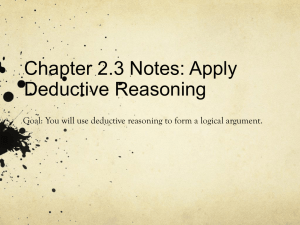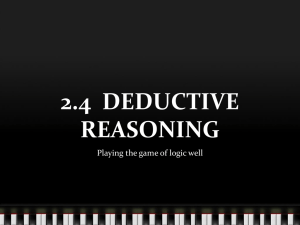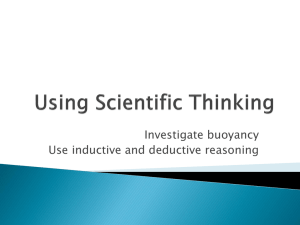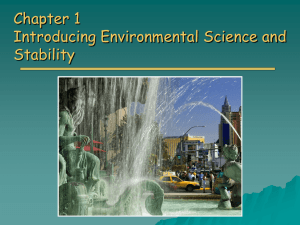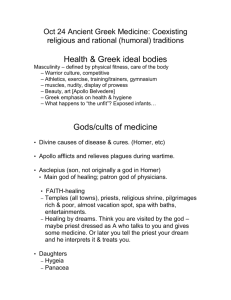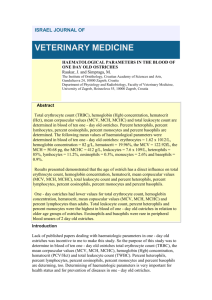God and Science
advertisement
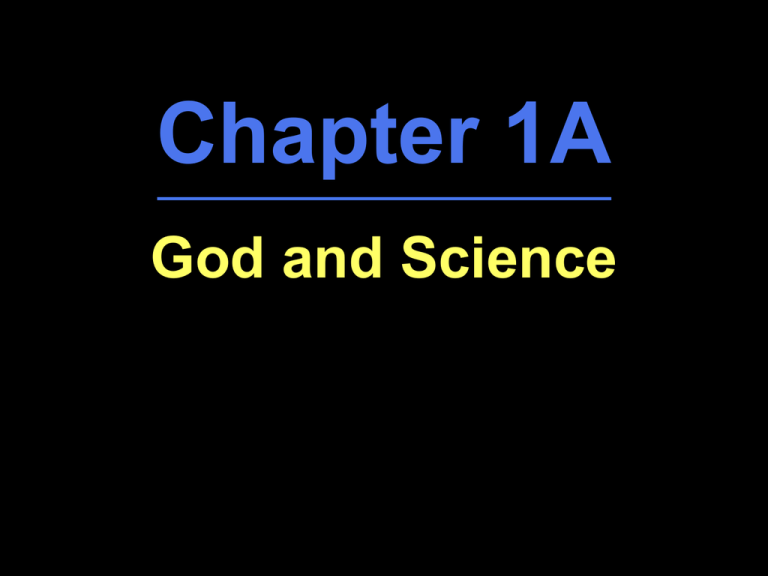
Chapter 1A God and Science Bio Biology logy bios + logos life study of Biology A Branch of Science Science A body of facts that man has gathered by observing the physical universe Fact Something that is true So what is truth? Is something true . . . … because people believe it? … because it seems to work? … because we have seen it happen repeatedly? … because it is logical? Is something true because people believe it? Doctrine of Humors Hippocrates 350 B.C. Doctrine of Humors Holds that living things are made up of four liquids, or “humors” For a person to be healthy, his humors must be in perfect balance. The 4 Humors Black bile: spleen Blood: heart Yellow bile: liver Phlegm: brain Is something true because it seems to work? Doctrine of Signatures Ancient Babylonians Doctrine of Signatures Held that God left behind signs or “signatures” to indicate cures for the illnesses resulting from Adam’s sin Is something true because it is seen repeatedly? Spontaneous Generation Theory that nonliving materials change into living organisms— spontaneously (abiogenesis) Spontaneous Generation Is spontaneous generation still believed today? YES Is something true because it seems logical? Logical Reasoning Inductive Deductive Inductive Reasoning Begins with a number of observed facts and derives a general conclusion Example Plants are living things, and they are made of cells. Animals are living things, and they are made of cells. Algae are living things, and they are made of cells. Therefore . . . All living things are made of cells. Deductive Reasoning Begins with a general principle and draws conclusions about specifics Deductive Reasoning The general principle is assumed to be true. Example • All boys are smart. • Jim is a boy. Therefore . . . Jim is Smart!! Deductive Reasoning If either of your premises is incorrect, your conclusion may be false. All birds fly. Cardinals are birds. Therefore, cardinals fly. Is the conclusion correct? Is the argument valid? Yes No The first premise is incorrect. All birds fly. Ostriches are birds. Therefore, ostriches fly. Is the conclusion correct? Is the argument valid? No No The first premise is incorrect. Is something true because it is accepted by faith? Faith Truth is not based upon what we believe. We should base what we believe upon truth. Truth: The Word of God The only sure source of truth is God’s truth. In John 17:17 Christ said, “Thy Word is truth.” Truth: The Word of God The only sure source of truth is God’s truth. In John 14:6 Christ said, “I am the way, the truth, and the life.” Truth: The Word of God God’s Word is truth. Nothing can disprove its claims. I Peter 1:25 says, “The Word of the Lord endureth forever.” Truth: The Word of God God’s Word is truth. Nothing can disprove its claims. Psalm 119:160a says, “Thy word is true from the beginning.” God’s Truth & Science Categories of Statements • Revealed truth—true because it is revealed in God’s Word • Theory—thought to be true • Fallacy—contradicts Scripture or scientific evidence • Truth by definition—defined by man God’s Truth & Science Is there a Conflict? • The same One who created the physical world inspired the Bible. • God gave man his senses and mind to observe the physical world. • God did not reveal all truth in the Bible. God’s Truth & Science Is there a Conflict? • We cannot have the same trust in what is not in the Bible as we can in what is in the Bible. • God’s truth will not contradict a proper interpretation of science. • Psalm 119:89—“For ever, O LORD, thy word is settled in heaven.” Conclusion Science is man’s attempts to observe and describe the natural processes God established to govern the universe. Science: Science is the collection of observations, inferences, and models produced through a systematic study of nature that enables humans to exercise proper dominion over God’s world.
